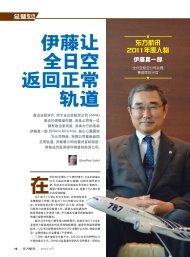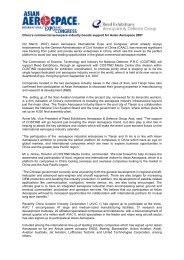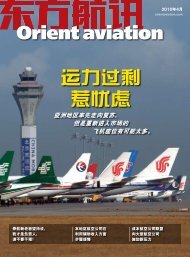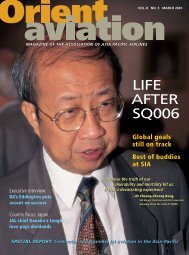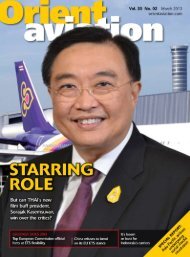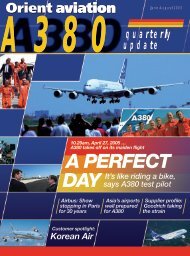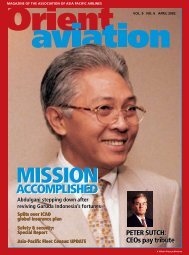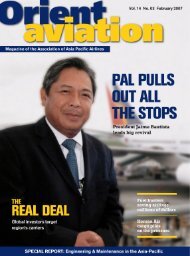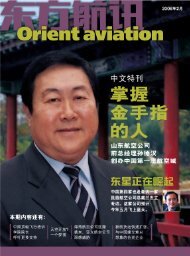Malaysia Airlines - Orient Aviation
Malaysia Airlines - Orient Aviation
Malaysia Airlines - Orient Aviation
You also want an ePaper? Increase the reach of your titles
YUMPU automatically turns print PDFs into web optimized ePapers that Google loves.
By Charles Anderson<br />
wants the entire supply chain to be<br />
monitored, starting with “certified shipper”<br />
or “regulated agent” systems that ensure<br />
freight is clean from the start.<br />
“If no one does anything about what<br />
goes into the shipment until it comes to an<br />
airline dock and then, whoops, we suddenly<br />
need security, we can’t do this efficiently,”<br />
he said.<br />
“But if you start earlier and run<br />
security throughout the entire process,<br />
including forwarders and certified shipper<br />
programmes, you can develop a strong<br />
freight assessment programme.”<br />
Boisen is keen the i ndust r y does<br />
not become over reliant on technology.<br />
“Throughout it all, you throw in a little<br />
randomness, some random inspections,”<br />
he said.<br />
“We are developing processes that<br />
hopefully will deter some intelligent<br />
terrorism, but you have to keep changing<br />
them.<br />
“Even if you X-ray 100% of your freight,<br />
and you say that’s your security method, you<br />
are going to fail. Someone will find how to<br />
beat you.”<br />
British-based security consultant,<br />
Norman Shanks, who worked on systems put<br />
in place at Hong Kong International Airport<br />
during its development stage, doesn’t believe<br />
current technology is up to the job.<br />
“The big cargo X-ray systems can’t find<br />
the small amounts of explosives we are<br />
looking for.<br />
“They are great for contraband, but<br />
pretty hopeless when it comes to the terrorist<br />
threat,” he said.<br />
“The big difficulty remains that there is<br />
still no effective way of screening bulk cargo<br />
and, until that is resolved, the only option<br />
is break-bulk screening, which means<br />
everything is broken down into individual<br />
items which can go through existing X-ray<br />
systems.<br />
“There’s a number of trials going on using<br />
variations of automated technology that have<br />
explosive detection capabilities. These are<br />
not basic X-rays, but a smarter system.”<br />
For now, the industry will have to cope<br />
with what it has got. “What we have is too<br />
expensive and slow,” said Shanks. “The<br />
industry wants to be able to screen cargo<br />
while it is in the container and only deal with<br />
items suggested as a possible threat, rather<br />
than break everything down to suitcase size,<br />
and then X-ray it.”<br />
That means carriers must rely on security<br />
checks throughout the process. “Basically,<br />
you verify the shipper and audit the<br />
movement of the goods,” said Shanks.<br />
But he is worried a cosy relationship<br />
built up between the shipper and the<br />
airline or regulated agent might muddy the<br />
waters and recommends the employment<br />
of independent cargo validators, as is the<br />
practice in the UK but not, believes Shanks,<br />
in the Asia-Pacific.<br />
In any case, “known shippers” are not<br />
widespread in the region, although they<br />
make it easier for customers to get their<br />
goods airborne.<br />
Hong Kong has had a programme in place<br />
for some years. Singapore’s did not get off the<br />
Korean Air: screens all cargo loaded on to passenger<br />
aircraft bound for the U.S., except for exempted items<br />
ground and Korean Air, the Asia-Pacific and<br />
world’s largest cargo carrier, said it has only<br />
one “known shipper”, admittedly a big one,<br />
in Samsung Logitec, which was certified by<br />
the local civil aviation safety authority last<br />
December.<br />
Korean Air screens all cargo going on to<br />
passenger aircraft bound for the U.S., either<br />
using X-rays or open screening, except for<br />
items exempted by authorities there.<br />
It advises customers to use all-cargo<br />
flights for bulky freight that can’t, as yet,<br />
be X-rayed.<br />
Jack Boisen, meanwhile, believes the time<br />
is coming when belly and full freighter cargo<br />
will be treated much the same.<br />
“Today, professionals in the security field<br />
look at the threat as different for cargo going<br />
on a passenger carrier, compared to cargo on<br />
a cargo carrier,” he said.<br />
“That stems from the fact that those who<br />
carry out terrorist acts are looking more at<br />
the impact of a terrorist attack involving<br />
passengers than on a cargo plane.<br />
“There are two levels of security, but I<br />
think there will be a blending of that. As time<br />
goes on, they will narrow the differences as<br />
we add more processes.”<br />
TIACA is urging international carriers to<br />
get involved in TSA working groups where<br />
they can get their message across, while<br />
IATA has teamed up with the International<br />
Federation of Freight Forwarders to form<br />
a task force which will work out how to<br />
protect the supply chain while keeping the<br />
cargo flowing.<br />
IATA director general, Giovanni<br />
Bisignani, spelt out why the association<br />
believes harmonization has not yet been<br />
achieved at an IATA cargo symposium in<br />
Mexico City.<br />
“Firstly, regulators often don’t understand<br />
our industry and approach cargo security in<br />
the same way as checked baggage,” he said.<br />
“Secondly, most don’t understand how the<br />
supply chain works. They focus on security<br />
at the end of the chain, not throughout the<br />
process.<br />
“Thirdly, governments are not talking<br />
to each other so they don’t have mutual<br />
recognition of standards, controls and<br />
programmes. And definitions, requirements<br />
and enforcement are inconsistent.<br />
“Finally, governments are not using<br />
technology effectively, particularly screening<br />
technology.<br />
“They are quick to mandate expensive<br />
bulk X-ray equipment, but are not making full<br />
use of the potential for canine techniques. The<br />
result is a costly mess.”<br />
JULY/AUGUST 2007 ORIENT AVIATION 33


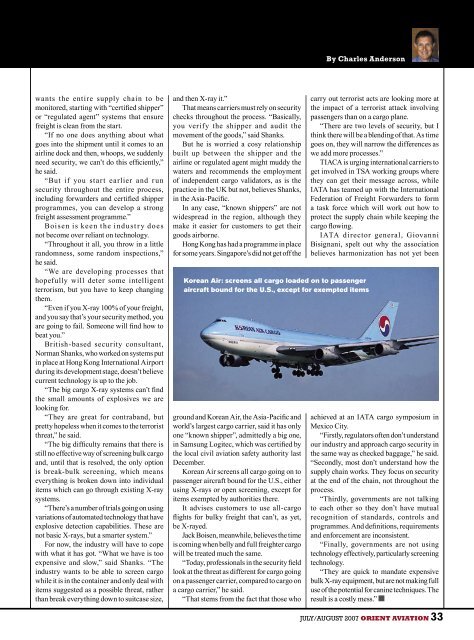
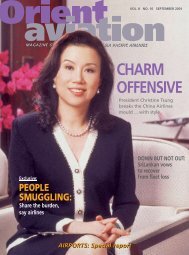
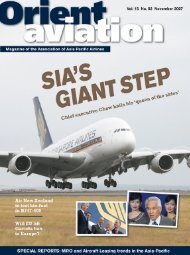
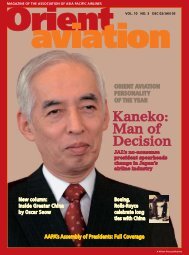
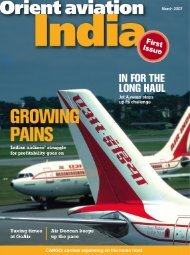
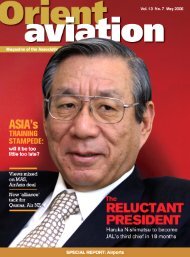
![OAMag-V7N4-Cover [Converted] - Orient Aviation](https://img.yumpu.com/48598575/1/190x255/oamag-v7n4-cover-converted-orient-aviation.jpg?quality=85)
